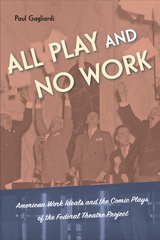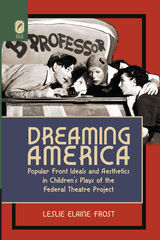2 books about Federal Theatre Project (U.S.)

All Play and No Work
American Work Ideals and the Comic Plays of the Federal Theatre Project
Gagliardi, Paul
Temple University Press, 2024
Many of the Federal Theatre Project (FTP) plays Paul Gagliardi analyzes in All Play and No Work feature complex portrayals of labor and work relief at a time when access to work was difficult. Gagliardi asks, what does it mean that many plays produced by the FTP celebrated forms of labor like speculation and swindling?
All Play and No Work directly contradicts the promoted ideals of work found in American society, culture, and within the broader New Deal itself. Gagliardi shows how comedies of the Great Depression engaged questions of labor, labor history, and labor ethics. He considers the breadth of the FTP’s production history, staging plays including Ah, Wilderness!, Help Yourself, and Mississippi Rainbow.
Gagliardi examines backstage comedies, middle-class comedies, comedies of chance, and con-artist comedies that employed diverse casts and crew and contained radical economic and labor ideas. He contextualizes these plays within the ideologically complicated New Deal, showing how programs like the Social Security Act straddled progressive ideals and conservative, capitalist norms. Addressing topics including the politicization of theatrical labor and the real dangers of unchecked economic con artists, the comic plays of the FTP reveal acts of political resistance and inequality that reflected the concerns of their audiences.
All Play and No Work directly contradicts the promoted ideals of work found in American society, culture, and within the broader New Deal itself. Gagliardi shows how comedies of the Great Depression engaged questions of labor, labor history, and labor ethics. He considers the breadth of the FTP’s production history, staging plays including Ah, Wilderness!, Help Yourself, and Mississippi Rainbow.
Gagliardi examines backstage comedies, middle-class comedies, comedies of chance, and con-artist comedies that employed diverse casts and crew and contained radical economic and labor ideas. He contextualizes these plays within the ideologically complicated New Deal, showing how programs like the Social Security Act straddled progressive ideals and conservative, capitalist norms. Addressing topics including the politicization of theatrical labor and the real dangers of unchecked economic con artists, the comic plays of the FTP reveal acts of political resistance and inequality that reflected the concerns of their audiences.
[more]

Dreaming America
Popular Front Ideals and Aesthetics in Children's Plays of the Federal Theatre Project
Leslie Elaine Frost
The Ohio State University Press
Dreaming America: Popular Front Ideals and Aesthetics in Children’s Plays of the Federal Theatre Project by Leslie Elaine Frost traces how the tumultuous politics of the late 1930s shaped the stories and staging of federally funded plays for children. Indeed, children’s theater was central to the Federal Theatre Project’s vision of building a national theater. Frost argues that representations of the child and childhood in the FTP children’s plays stage the hopes and anxieties of a nation destabilized by both economic collapse and technological advances. A declining economy and the first stagnant birthrate in three centuries yoked the national economy to the individual family. Profound disagreements over appropriate models of education and parenting, as well as over issues of ethnicity and class, constituted fundamental arguments over democratic values and social norms.
Frost locates these plays within the immediate context of the production materials in the FTP archives, as well as within the broader culture of the Great Depression, drawing on disparate primary materials—from parenting magazines to strike literature to political journals—and referencing a range of popular events—from the Joe Louis/Max Schmeling fights to Hollywood movies.
As the focus of Depression-era adult anxieties and hopes and as the embodiment of vigor, dynamism, and growth, children carried symbolic value both as the future of America and as the America of the future. Frost examines representative plays’ connections to other media, culture, and politics to situate their singular trajectories in the social history of the Federal Theatre Project and Popular Front culture.
[more]
READERS
Browse our collection.
PUBLISHERS
See BiblioVault's publisher services.
STUDENT SERVICES
Files for college accessibility offices.
UChicago Accessibility Resources
home | accessibility | search | about | contact us
BiblioVault ® 2001 - 2024
The University of Chicago Press









